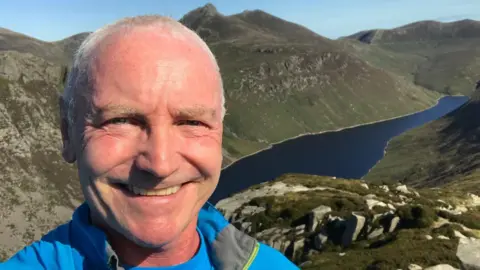 Mark Robson
Mark RobsonMark Robson has one of the most recognisable voices in rugby commentary.
To outsiders, he has been living the dream – travelling the world covering a sport he is passionate about.
But in reality, he was suppressing a dark and distressing secret.
He was abused at Bangor Grammar School by the prolific paedophile Lindsay Brown.
The vice principal served two sentences for abusing boys at the County Down school – seven years in 1998 for a catalogue of abuse between 1968 and 1982 and for a further eight months for similar offences in 2021. He died in 2023.
Warning: This article contains distressing content
“He had a type and I was it: blonde hair and blue eyes,” Robson told the BBC’s The State of Us podcast.
“I didn’t tell anyone, not even my schoolmates. I thought I was the only one.”
Speaking on the podcast, Robson has revealed publicly for the first time the extent and impact of the abuse he endured from Brown.
‘I was in denial’
Robson describes Brown as a charismatic and very popular teacher.
“All the parents loved him, all the staff loved him,” he said.
“The boys who weren’t being abused loved him.
“His grooming technique, which I’m not going to reveal because I don’t want to give anyone any ideas, was incredibly clever and incredibly devious because he made me feel that he loved me.”
Not telling anyone was part of Robson’s attempt to deal with what had happened to him. That continued until he was well into adulthood.
“I loved my life because I refused to accept this had ever occurred,” he said.
“I was in denial, I buried it.”

When he was 28, Robson received a phone call that changed everything.
“It was the then (police) vice squad and they said, ‘We hear you were one of Lindsay Brown’s boys’. I’ll never forget the words the girl on the phone used.
“The effect on me was catastrophic.
“It was only then I realised what had happened to me.”
The commentator was about to go to New Zealand to cover the Commonwealth Games for the BBC.
“I went completely nuts in New Zealand,” he said.
“We broadcast all day and drank and partied all night – that was my way of trying to drown away these thoughts that were in my head.”
When he came back, he developed symptoms of Myalgic Encephalomyelitis (ME) and said he went into “complete mental and physical freefall”.
That lasted for almost 20 years.
By the time he was 40, he had left his job at Sky Sports and came home to Bangor to live with his parents.
“I became non-verbal for two years and I was confined to the house – I disappeared,” he said.
“I didn’t see the point in speaking. My head at that time was full of white noise. I had no room for words.”
Disclosing to his parents what Brown had done was difficult. Neither had any idea their son was one of his victims.
When he was ill and housebound, Robson said his father became his rock and cared for him every day.
“He would tell me to get up out of bed and have a cup of tea – and he was right. If I did that, it was a successful day.”
While his recovery has been slow, he is now back working as a successful commentator.
“For the last 15 years, I have been well,” he said.
“I still have this burning anger – mostly directed at the world. I’m angry about him and what happened and it affects my personality.”
His escape, he said, has been exercise. He enjoys fell running in mountains around the world and sea swimming close to home in Bangor.
“It releases endorphins and has helped me to recover,” he added.
You can listen to the full interview on The State of Us podcast on BBC Sounds.
If you have been affected by any of the issues raised in this story please see the BBC’s Action Line for groups and resources which may be able to help.
